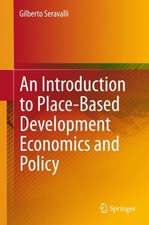From Reproduction to Evolutionary Governance: Toward an Evolutionary Political Economy: Evolutionary Economics and Social Complexity Science, cartea 20
Editat de Kiichiro Yagien Limba Engleză Hardback – 19 mar 2020
This book combines modern evolutionary economics and classical political economy. Modern evolutionary economics with its pluralistic and contingent view of reproduction does not presuppose equilibrium or harmonious reproduction. A society that consists of multiple agents needs to establish an order from the interactions of those agents. The book introduces a normative and a practical dimension where mutual justification occurs through the act of exchange. Mutual justification ultimately leads to the emergence of social and economic order, an approach that the author dubs “approval theory.” The division of labor proceeds alongside the emergence of money and capital, and the book discusses the dual structure of the real and financial economy that is the consequence. It then interprets collective action using the twin concept of voice and exit and proposes the concept of evolutionary governance to explain the politico-economic aspects of the social economy.
As such, this book shows the promising direction in which the modern political economy is now proceeding, in accordance with the contingent process of evolutionary reproduction. Further, two collaborating authors supply a game-theoretical interpretation of approval theory and an exploration of the evolution of dynamical systems, respectively.
Toate formatele și edițiile
| Toate formatele și edițiile | Preț | Express |
|---|---|---|
| Paperback (1) | 523.22 lei 6-8 săpt. | |
| Springer – 19 mar 2021 | 523.22 lei 6-8 săpt. | |
| Hardback (1) | 698.80 lei 6-8 săpt. | |
| Springer – 19 mar 2020 | 698.80 lei 6-8 săpt. |
Din seria Evolutionary Economics and Social Complexity Science
- 18%
 Preț: 792.34 lei
Preț: 792.34 lei - 15%
 Preț: 643.84 lei
Preț: 643.84 lei - 18%
 Preț: 723.21 lei
Preț: 723.21 lei - 18%
 Preț: 742.61 lei
Preț: 742.61 lei - 24%
 Preț: 634.35 lei
Preț: 634.35 lei - 15%
 Preț: 639.08 lei
Preț: 639.08 lei - 18%
 Preț: 730.16 lei
Preț: 730.16 lei - 15%
 Preț: 706.48 lei
Preț: 706.48 lei - 15%
 Preț: 583.61 lei
Preț: 583.61 lei - 18%
 Preț: 784.30 lei
Preț: 784.30 lei - 18%
 Preț: 721.01 lei
Preț: 721.01 lei - 15%
 Preț: 527.15 lei
Preț: 527.15 lei - 15%
 Preț: 644.63 lei
Preț: 644.63 lei - 15%
 Preț: 523.22 lei
Preț: 523.22 lei - 15%
 Preț: 638.24 lei
Preț: 638.24 lei - 18%
 Preț: 728.60 lei
Preț: 728.60 lei -
 Preț: 388.90 lei
Preț: 388.90 lei - 18%
 Preț: 737.26 lei
Preț: 737.26 lei - 15%
 Preț: 696.35 lei
Preț: 696.35 lei - 15%
 Preț: 690.11 lei
Preț: 690.11 lei - 15%
 Preț: 692.24 lei
Preț: 692.24 lei - 18%
 Preț: 1006.24 lei
Preț: 1006.24 lei - 24%
 Preț: 570.15 lei
Preț: 570.15 lei -
 Preț: 388.72 lei
Preț: 388.72 lei - 18%
 Preț: 789.52 lei
Preț: 789.52 lei - 18%
 Preț: 1004.81 lei
Preț: 1004.81 lei - 15%
 Preț: 642.68 lei
Preț: 642.68 lei - 18%
 Preț: 730.65 lei
Preț: 730.65 lei - 18%
 Preț: 729.53 lei
Preț: 729.53 lei - 15%
 Preț: 695.85 lei
Preț: 695.85 lei - 18%
 Preț: 732.52 lei
Preț: 732.52 lei
Preț: 698.80 lei
Preț vechi: 822.12 lei
-15% Nou
Puncte Express: 1048
Preț estimativ în valută:
133.76€ • 145.34$ • 112.43£
133.76€ • 145.34$ • 112.43£
Carte tipărită la comandă
Livrare economică 21 aprilie-05 mai
Preluare comenzi: 021 569.72.76
Specificații
ISBN-13: 9784431549970
ISBN-10: 4431549978
Pagini: 214
Ilustrații: XVII, 190 p. 25 illus., 17 illus. in color.
Dimensiuni: 155 x 235 mm
Greutate: 0.47 kg
Ediția:1st ed. 2020
Editura: Springer
Colecția Springer
Seria Evolutionary Economics and Social Complexity Science
Locul publicării:Tokyo, Japan
ISBN-10: 4431549978
Pagini: 214
Ilustrații: XVII, 190 p. 25 illus., 17 illus. in color.
Dimensiuni: 155 x 235 mm
Greutate: 0.47 kg
Ediția:1st ed. 2020
Editura: Springer
Colecția Springer
Seria Evolutionary Economics and Social Complexity Science
Locul publicării:Tokyo, Japan
Public țintă
ResearchCuprins
I Introduction.- II From Reproduction To Evolution (1 Reproduction as Basic Perspective of Political Economy 2 Reproduction of What? 3 Subjects and Needs as Ontological Concept 4 Selection, Adaptation, and Innovation in Evolutionary Process 5 Evolutionary Rationality?)Appendix: Fisher's Theorem and Its Interpretation by Price (Tomonori Koyama).- III Emergence Of Subjects And Order (1 Property: Needs-Production-Appropriation 2 Social Contract Revisited 3 Reciprocal Recognition 4 Social and Economic Exchange 5 Orders and Governance). Appendix: Nested Reasoning Structure under Bounded Recognition(Tetsuya Kawamura).- IV Individual And Collective Action (1 Limits of Autistic Agents 2 Exit and Voice 3 Rise and Fall of Norms and Loyalty 4 Structured Governance under Capitalism).- V Money, Capital, And Finance (1 On Value Form 2 Duplicated World of Capitalism 3 Finance-Led Capitalism 4 Dissolution of Capitalism into Civil Society).- VI From Finance-Led Capitalism To Needs-OrientedEconomy (1 Three Layers of Political Economy 2 Private and Public in Civil Society 3 Governance in Evolutionary Process –Path-Shaping Strategy).
Notă biografică
Kiichiro Yagi is the ex-president of Setsunan University, Osaka, Japan. He taught History of Economics and Political Economy at Okayama University, Kyoto University, and Setsunan University. He served as the President of Japan Society of the History of economic Thought, Japan Association for Evolutionary Economics, and Japan Society of Political Economy, successively. His many publication includes Social Economics of Modern Japan (1999 in Japanese), Potitical Economy (2006 in Japanese), and Austrian and German Economic Thought (2011 in English). He is currently the editor-in-chief of Evolutionary and Institutional Economic Review.
Tetsuya Kawamura is lecturer of the faculty of management at Japan University of Economics, Tokyo. He received PhD from Kyoto University in 2009. He published “Experimental Multimarket Contact Inhibits Cooperation” in Metroeconomica (2015) and “Cognitive ability and human behavior in experimental ultimatum games” in Research in Economics (2019). His recent research is directed to the relation between intelligence and social preference. He uses laboratory and field experiments to study the relationship between intelligence and strategic choice.
Tetsuya Kawamura is lecturer of the faculty of management at Japan University of Economics, Tokyo. He received PhD from Kyoto University in 2009. He published “Experimental Multimarket Contact Inhibits Cooperation” in Metroeconomica (2015) and “Cognitive ability and human behavior in experimental ultimatum games” in Research in Economics (2019). His recent research is directed to the relation between intelligence and social preference. He uses laboratory and field experiments to study the relationship between intelligence and strategic choice.
Tomonori Koyama is assistant professor of the faculty of psychology at Yasuda Women’s University, Hiroshima, Japan. He received PhD from Kyoto University in 2012 on the thesis "Re-examination of J. Stanley Metcalfe’s Evolutionary Market Analysis: Focusing its relation to R. A. Fisher’s Fundamental Theorem of Natural Selection" (in Japanese). His fields of research are the interconnection of dynamical system with statistical inference, the criticism of utilitarianism, and the social design of regional revitalization.
Textul de pe ultima copertă
This book combines modern evolutionary economics and classical political economy. Modern evolutionary economics with its pluralistic and contingent view of reproduction does not presuppose equilibrium or harmonious reproduction. A society that consists of multiple agents needs to establish an order from the interactions of those agents. The book introduces a normative and a practical dimension where mutual justification occurs through the act of exchange. Mutual justification ultimately leads to the emergence of social and economic order, an approach that the author dubs “approval theory.” The division of labor proceeds alongside the emergence of money and capital, and the book discusses the dual structure of the real and financial economy that is the consequence. It then interprets collective action using the twin concept of voice and exit and proposes the concept of evolutionary governance to explain the politico-economic aspects of the social economy.
As such, this book shows the promising direction in which the modern political economy is now proceeding, in accordance with the contingent process of evolutionary reproduction. Further, two collaborating authors supply a game-theoretical interpretation of approval theory and an exploration of the evolution of dynamical systems, respectively.
Caracteristici
Synthesizes classical political economy and modern evolutionary economics Introduces the emergence of social and market order from the dialectics of approval and exchange into the theory of political economy Sheds new light on governance in the market and in society, adopting an evolutionary perspective



















